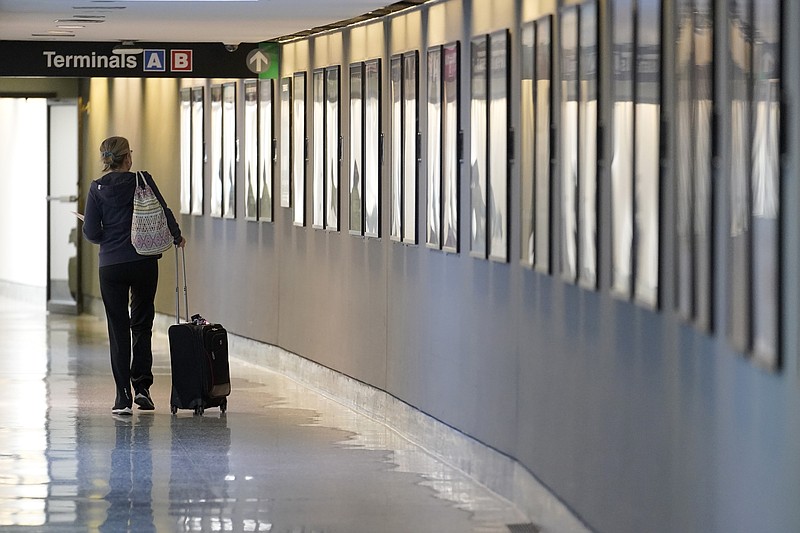By SAM KEMMIS of NerdWallet
Prices for travel remain stubbornly high. The cost of airfare in February was 27% higher than the same month a year earlier, according to U.S. Bureau of Labor Statistics data . And rental car prices -- having shot up during the pandemic -- remain high today, as they're 37% pricier in February than they were in the same month in 2019.
Yet costlier travel is not deterring younger Americans who are eager to hit the road (and the skies) this year. A whopping 87% of 18-to-29-year-olds and 90% of 30-to-44-year-olds intend to travel this summer, according to a March survey by The Vacationer. If the economy is slowing, younger travelers aren't heeding the memo.
"When I meet with folks, they're not budgeting," says Dylan Snowden, a financial coach . "Most will just think about hotels and flight, but not the fact that they need to feed themselves three times a day."
Ignoring the broader economic trends (like the rising cost of eating out) could mean stormy financial waters ahead for these vacationers. On top of inflation, savings are down, debt is up and the economy could be headed for a recession. Add the potential for student loan payments restarting this year, and a dire picture begins to emerge for those under 40.
Could this be the year that pandemic-related "revenge travel" turns into "regret travel"?
BALLOONING DEBT
As savings that built up during the pandemic begin to dwindle , vacationers facing high travel costs have two choices: cut costs or turn to debt. And it seems that younger Americans are opting for the latter.
Generation Z accrued 6% more credit card debt between the first and second halves of 2022, according to a January 2023 report from Credit Karma, while millennials racked up 5% more. Baby boomers added only 2% more credit card debt over the same period.
"Since people don't budget, they underestimate how big their debt will be," says Snowden. "They don't leave on those trips expecting to go $7,000 in debt, but then they do."
And younger Americans are struggling to pay these debts off. The rate of credit card delinquencies has risen significantly for Americans in their 20s and 30s, surpassing pre-pandemic rates, according to a 2023 report from The Federal Reserve Bank of New York. Not so for older Americans, whose delinquency rates have remained relatively flat.
THE RISE OF BUY NOW, PAY LATER SERVICES
Another potential factor in costlier travel: the rise in popularity of "buy now, pay later" for travel expenses . These services split payments over installments, easing sticker shock for airfare and hotel stays while creating more debt by another name.
"Somebody doesn't sign up for Klarna just one time," says Snowden, citing a popular buy now, pay later service. "They'll do it for multiple purchases, so that debt will grow."
Buy now, pay later has proven especially attractive among younger consumers. A n August 2022 NerdWallet survey conducted by The Harris Poll found that 50% of millennials and 44% of Gen Z had used one of these services in the last 12 months, compared with 25% of Generation X and merely 14% of baby boomers.
Mounting debt and deferred payments could hit travelers hard, especially as layoffs increase and some economic forecasters predict a recession later in the year. And another $1 trillion shoe could still drop: student loans.
STUDENT LOANS LOOM
The average student loan debt for borrowers ages 35-49 is $43,280 and $32,750 for the 25-34 age range, according to 2023 data from the U.S. Department of Education's Federal Student Aid Office. Yet these loans have not had a major impact on finances because the pandemic-era pause on payments remains in effect.
"It's been so long since people have had to think about it," says Snowden. "It's really hard for folks to realize that it might actually start up again."
Yet those payments could resume soon -- possibly by late summer. This could create a perfect storm of financial pressure, as mounting debt mixes with a weak economy and increased student loan payments.
SAVE NOW, VACATION LATER
Is it all doom and gloom for young travelers? Not necessarily. Some may still be working through savings surpluses. And the labor market remains strong , buoying incomes.
Experts suggest young travelers take a hard look at their finances before booking another vacation this year and potentially accruing more debt.
"Save now, vacation later," implores Snowden. "You'll enjoy every minute of that vacation and not stress when you come home to a big bill. You deserve to feel good about it before you go, when you're there and when you come back."
